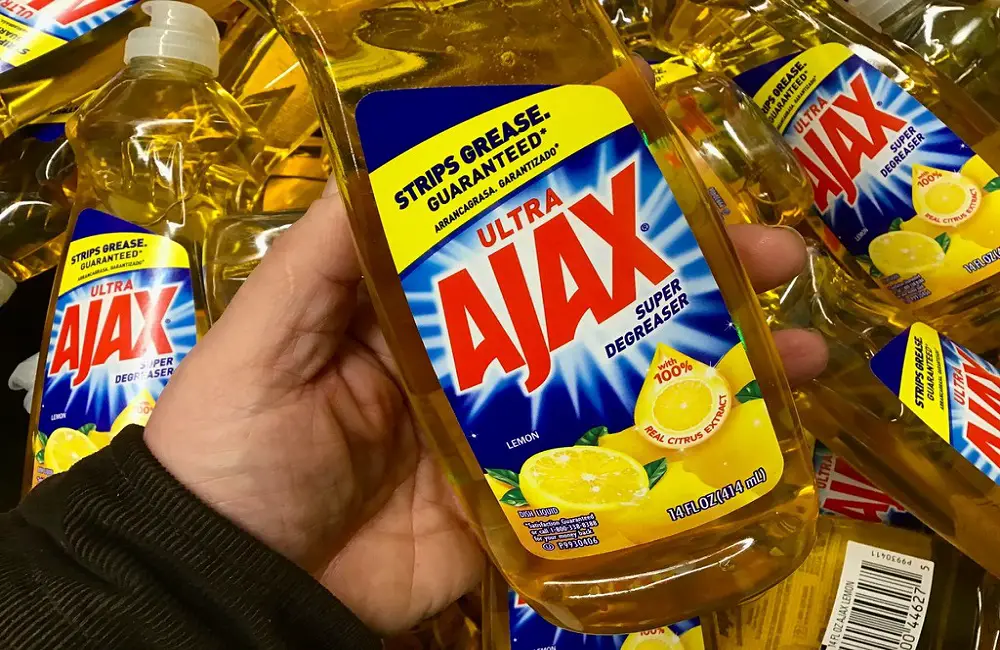When it comes to home duties, improvisation can occasionally be required. It’s possible that you’ll find yourself gazing at a mountain of laundry without any detergent in sight. It makes sense that you would ask, “Can I use dishwashing soap for laundry?” But before you run out and get some dishwashing liquid, let’s take a closer look at if this is a workable answer.
The Composition of Dishwashing Soap
Dishwashing soap, sometimes referred to as dishwashing liquid or detergent, is designed to dissolve oil, food residue, and dirt from dishes. Surfactants, enzymes, perfumes, and colors are usually present.
Together, these components help clean your dishes, pots, and pans of food residue and stains. Because they reduce water’s surface tension and improve its ability to spread and penetrate, surfactants are especially significant.
Laundry Detergent vs. Dishwashing Soap
Contrarily, laundry detergent is made especially for cleaning textiles. It contains a blend of builders, surfactants, and enzymes that help get rid of oils, stains, and grime from clothes. Additionally, laundry detergents are designed to function well with a range of fabric kinds and water temperatures.
Laundry detergents differ greatly from one another in that they are made to create very little suds. This is crucial because an excessive amount of suds might obstruct the rinsing and mechanical functions of the washing machine. On the other hand, dishwashing soap is renowned for having strong sudsing qualities, which might lead to problems in a washing machine.
The Risks of Using Dishwashing Soap for Laundry
- Excessive Sudsing: The excessive sudsing that dishwashing soap can produce in your washing machine is one of the main hazards associated with using it. Sudsy loads are too much for washing machines to manage. An excessive amount of suds can cause overflow problems, which could harm your computer and leave a mess. Furthermore, too much foam might obstruct clothes from being properly rinsed, leaving a residue that can irritate skin.
- Residue on Clothes: Dishwashing soap is not designed to rinse out of fabrics as effectively as laundry detergent. This can result in a soapy residue remaining on your clothes, which can feel sticky or stiff. This residue can also attract dirt, making your clothes look dingy over time.
- Skin Irritation: The fragrances and dyes in dishwashing soap, while pleasant on dishes, may not be so friendly to your skin, especially if left on fabrics. Prolonged contact with these chemicals can cause skin irritation, rashes, or allergic reactions, particularly for those with sensitive skin.
- Damage to Fabrics: Some dishwashing soaps contain harsh ingredients that might be too aggressive for certain fabrics. Over time, this can lead to fading, weakening of fibers, or damage to delicate materials like wool and silk.
When You Might Consider Using Dishwashing Soap
Despite the risks, there may be times when using dishwashing soap for laundry seems like your only option. If you find yourself in a pinch, here are some tips to minimize potential problems:
- Use Sparingly: If you must use dishwashing soap, use only a small amount—no more than a teaspoon. This will help reduce the risk of excessive sudsing and make rinsing easier.
- Pre-Treat Stains: Dishwashing soap can be effective for pre-treating oily stains on clothes. Apply a tiny amount directly to the stain, gently rub it in, and let it sit for a few minutes before rinsing with water.
- Hand Wash: Consider hand washing smaller items using dishwashing soap. This allows you to control the amount of soap used and ensures thorough rinsing. Fill a sink or basin with warm water, add a few drops of dishwashing soap, and gently agitate your clothes before rinsing well with clean water.
Alternatives to Dishwashing Soap
Before resorting to dishwashing soap, consider some alternative solutions:
- Baking Soda and Vinegar: White vinegar and baking soda combined can be used as an alternative laundry detergent. For the wash cycle, add half a cup of baking soda, and for the rinse cycle, add half a cup of vinegar. This can assist in deodorizing and cleaning your clothing.
- Borax: Borax is a versatile cleaning agent that can be used in laundry. Adding half a cup of borax to your wash cycle can help boost the cleaning power of your regular detergent or act as a substitute when you’re out of detergent.
- Soap Nuts: Soap nuts are natural, eco-friendly laundry cleaners. They contain saponin, a natural surfactant, and can be used as a detergent alternative. Place a few soap nuts in a small muslin bag and toss them into the washing machine with your clothes.
- Castile Soap: Castile soap is a gentle, plant-based soap that can be used for various cleaning tasks, including laundry. Use a small amount in your washing machine or hand wash with it.
Conclusion
In an emergency, it may be tempting to use dishwashing soap for laundry, but because of the possible risks and problems, it’s generally not a good idea. Dishwashing soap’s formulation is not intended for use with fabrics or washing machines; using it may result in overly sudsy garments, skin irritation, and even damage to textiles.
If you run out of laundry detergent, you may be able to get by with baking soda, vinegar, soap nuts, borax, or Castile soap. These solutions can quickly and efficiently clean your laundry while also being safer for your clothing and washing machine.
In conclusion, dishwashing soap is a useful household cleaner, but it should be used just for the goal of keeping your dishes spotless. To get the best results and prolong the life of your washing machine and garments, choose products made especially for materials for your laundry needs.

